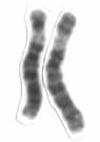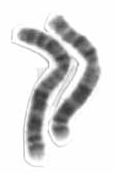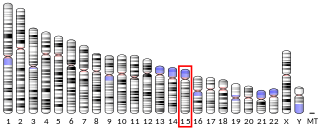Related Research Articles

Chromosome 1 is the designation for the largest human chromosome. Humans have two copies of chromosome 1, as they do with all of the autosomes, which are the non-sex chromosomes. Chromosome 1 spans about 249 million nucleotide base pairs, which are the basic units of information for DNA. It represents about 8% of the total DNA in human cells.

Chromosome 6 is one of the 23 pairs of chromosomes in humans. People normally have two copies of this chromosome. Chromosome 6 spans more than 172 million base pairs and represents between 5.5 and 6% of the total DNA in cells. It contains the major histocompatibility complex, which contains over 100 genes related to the immune response, and plays a vital role in organ transplantation.

Chromosome 2 is one of the twenty-three pairs of chromosomes in humans. People normally have two copies of this chromosome. Chromosome 2 is the second-largest human chromosome, spanning more than 242 million base pairs and representing almost eight percent of the total DNA in human cells.

Chromosome 17 is one of the 23 pairs of chromosomes in humans. People normally have two copies of this chromosome. Chromosome 17 spans more than 84 million base pairs and represents between 2.5 and 3% of the total DNA in cells.

MID1 is a protein that belongs to the Tripartite motif family (TRIM) and is also known as TRIM18. The MID1 gene is located on the short arm of the X chromosome and loss-of-function mutations in this gene are causative of the X-linked form of a rare developmental disease, Opitz G/BBB Syndrome.

Ubiquitin-conjugating enzyme E2 D2 is a protein that in humans is encoded by the UBE2D2 gene.

Tripartite motif-containing protein 37 is an E3 ubiquitin ligase in humans that is encoded by the TRIM37 gene.

Tripartite motif-containing protein 25 is a protein that in humans is encoded by the TRIM25 gene.

The human gene UBR1 encodes the enzyme ubiquitin-protein ligase E3 component n-recognin 1.

Midline-2 is a protein that in humans is encoded by the MID2 gene.

Tripartite motif-containing protein 32 is a protein that in humans is encoded by the TRIM32 gene. Since its discovery in 1995, TRIM32 has been shown to be implicated in a number of diverse biological pathways.

GTP-binding protein ARD-1 is a protein that in humans is encoded by the TRIM23 gene.

Tripartite motif-containing 22, also known as TRIM22, is a protein which in humans is encoded by the TRIM22 gene.

E3 ubiquitin-protein ligase TRIM33, also known as (ectodermin homolog and tripartite motif-containing 33) is a protein encoded in the human by the gene TRIM33, a member of the tripartite motif family.

Tripartite motif-containing protein 3 is a protein that in humans is encoded by the TRIM3 gene.

Tripartite motif-containing protein 9 is a protein that in humans is encoded by the TRIM9 gene.

Tripartite motif-containing protein 6 is a protein that in humans is encoded by the TRIM6 gene.

Tripartite motif-containing protein 11 is a protein found in humans that is encoded by the TRIM11 gene.

Tripartite motif containing 69 is a protein that in humans is encoded by the TRIM69 gene.

Tripartite motif containing 38 is a protein that in humans is encoded by the TRIM38 gene.
References
- ↑ "Entrez Gene: TRIM50 tripartite motif-containing 50".
- ↑ Micale L, Fusco C, Augello B, Napolitano LM, Dermitzakis ET, Meroni G, Merla G, Reymond A (2008). "Williams–Beuren syndrome TRIM50 encodes an E3 ubiquitin ligase". European Journal of Human Genetics. 16 (9): 1038–49. doi:10.1038/ejhg.2008.68. PMC 2680067 . PMID 18398435.